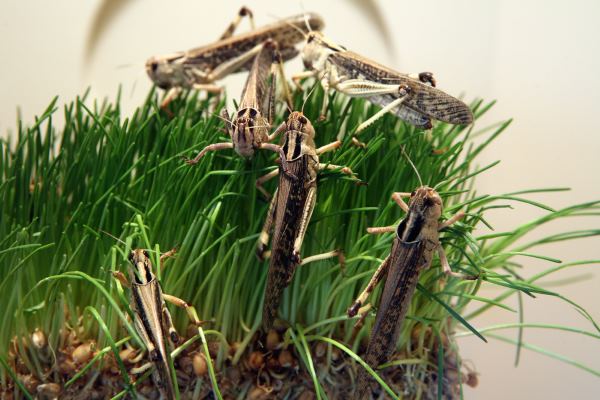We flood the fields with pesticides, but pests and all-eating pests actually tend to increase due to climate change, so always our fault. This is the sad and worrying forecast that emerged from a study by the University of Vermont (USA) which warns: food will tend to decrease (while the population on earth, as is known, is increasing)
We flood the fields with pesticides, but pests and pest-eating insects (such as grasshoppers, for example) actually tend to increase due to climate change, therefore always our fault. This is the sad and worrying forecast that emerged from a study by the University of Vermont (USA) which warns: food will tend to decrease (while the population on earth, as is known, is increasing).
Rice, corn, wheat, not "superfluous" foods: these are the crops that risk being increasingly scarce due to parasites and pests that feed us on these crops and in a very voracious way. Pests and insects that are often fought with questionable methods such as pesticide spraying.
The researchers observed how these organisms respond to a range of climate scenarios, finding that rising global temperatures can lead to increased crop losses, especially in temperate regions. The calculations show in particular that the losses will be del 10-25% per degree of heating.
Disaster announced? From the forecasts it follows that a 2 degree increase in the global average temperature will result total crop losses of approximately 213 million tons for the three crops. And, unfortunately, the global warming trend does not seem to be reversing, quite the contrary.
Indeed, despite repeated alarms from scientists and climate agreements, levels of CO2, which significantly contributes to the rise in temperature on the planet, continue to rise due to human activities, beating their sad records year after year.
The losses will come from two factors, scientists argue: a increased metabolism of insects it's a faster growth rate of their populations. As for the metabolism "when the temperature rises, the metabolism of insects increases, so they have to eat more" explains Scott Merrill, co-author of the work - and this will damage the crops ".
But why will the temperate regions (where, for example, we live) be the most affected?

The link with population growth, on the other hand, is more complex. Insects have an optimal temperature, the researchers continue, at which their population grows best. So if it's too cold or too hot it will slow down. This is why the losses will be greater in temperate regions, and less severe in the tropics, where the optimum temperature has already been reached.
And it will be a particular problem for wheat, generally grown in these climates. Corn, more "widespread", will have an uneven behavior, while rice, usually more suitable for warmer climates, will suffer less because, with a further increase in temperatures, the increase in insect metabolism will be counterbalanced by a slowdown the growth of their populations.
Result? The largest yield losses will occur in some of the most productive agricultural regions of the world. “[…] If you grow a lot of food in a temperate region, there will be more losses,” warns Merrill.
Recall that already currently more than 2 billion people around the world they are deficient in one or more nutrients and that many humans rely on these three crops which together account for 42% of the calories we consume on Earth.
The study also "sadly recalls" another very recent one, from Harvard University, according to which the increase in carbon dioxide emissions (and therefore also in terms of temperature on Earth) is leading to a further impoverishment of wheat and rice, with resulting nutritional deficiencies for us.
All this can only lead to a worsening of food insecurity, especially in those parts of the world where this is already widespread. And insecurity, poverty, social differences lead to conflicts and tensions, to which, unfortunately, insufficient and very short-sighted answers are often given.
A sad and worrying scenario, the only one that should really scare.
The work, funded by the National Science Foundation and the Gordon and Betty Moore Foundation, was published in Science.
Read also:
- Record CO2 emissions: never higher in 3 million years
- Our Planet has a high, indeed very high 'fever'
- Limiting global warming would save most plants and animals
Roberta de carolis


























